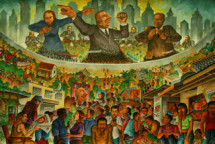The agrarian question in Brazilian Amazonia: Authoritarian populism and neo-clientalism among timber companies and riberinho communities in western Para state, Brazil
Topics
Regions
How is authoritarian populism reconfiguring relationships between timber companies and riberhino communities in Brazilian Amazonia?

Authors
Specifically, we examine the ways in which institutions of the state, under the Workers Party (PT) Governments of 2003 - 2016, can be said to be in the service of timber companies, in that loggers are able to use the police force and judicial powers against the traditional peoples and communities, ultimately forcing them into neo-clientelist relations of dependency. We explore these dynamics in Cachoeira do Aruã locality in the municipality of Santarém in Para State, Brazilian Amazonia. Here, communities are experiencing the reproduction of relations of dependency with timber companies. These communities have benefited from the creation of the Agroextractivist Settlement Project (PAE) of Lago Grande, a modality of agrarian reform specifically aimed at formalising the settlement of traditional communities.
However, despite the significance of this initiative in terms of territorial recognition, the failure of the state to implement public policies aimed at traditional communities left the group in a situation where they lacked even their constitutional rights, forcing them into neo-clientalist relations with timber companies. State intransigence vis-à-vis rights of traditional communities contrasts with its pro-active lavishing of benefits on international timber companies. From Lula’s first term until the impeachment, in 2016, of Lula’s successor, Dilma Rousseff, one notices the collapse of political structures that had been present for decades, and social movements beginning to move away from their traditional bases of support. Simultaneously, unopposed, the latifundio and agribusiness class has consolidated power, both through intensified land grabbing and illegal logging, and as a political force.
This paper was presented at the Emancipatory Rural Politics Initiative (ERPI) 2018 Conference: "Authoritarian Populism and the Rural World"